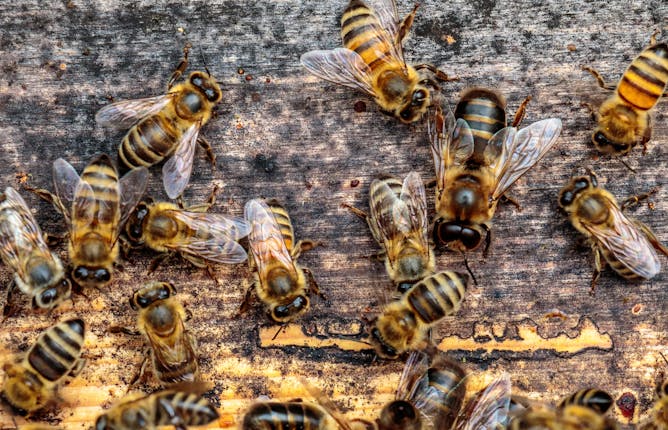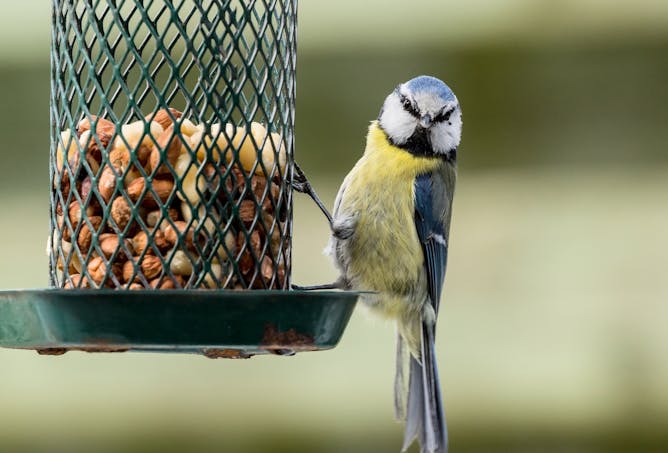|
|
|
|
From just a few days old until they die, around three weeks later, male honeybees leave the hive several times a day on a mission to complete their only goal in life – to find a queen and mate with her. But where the bees go to have sex has been a source of mystery for a long time. For one thing, bee mating happens 50 metres in the air, making it incredibly difficult for researchers to study.
But now, scientists are a step closer to understanding their mysterious behaviour. Over the course of two years, a team of researchers strapped tiny radar reflectors onto male honeybees and tracked where they went. The results showed males gather in large swarms, increasing their chances of bumping into the queens. But how they know where to gather remains a mystery.
If you’ve got a bird feeder in your garden it might be great for some birds, but not for others. New research has found blue tits benefit the most from bird feeders, in some cases travelling over 1km to get their beaks on the tasty snacks. But species that are a bit less confident – like the marsh tit, willow tit, pied flycatcher, wood warbler and lesser spotted woodpecker – might be losing out.
Do you know what the term “woke” means? If not, you’re not alone. A new study suggests the public is completely split on their understanding of the word, with a quarter saying it’s a compliment, a quarter that it’s an insult – and the rest having little clue what the term even means. Which all raises questions about whether the UK is really as much in the grip of a culture war as some like to portray.
And watch out later today for our report on what really mattered in Dominic Cummings’ testimony to parliament yesterday.
We love to bring you this kind of expert analysis, but we can’t do it without your help. A huge thank you to anyone who has supported us so far. It’s the last week of our campaign, and we really appreciate anything you can spare.
Donate now
|
Abigail Beall
Science and Tech Editor
|

|
|

Shutterstock/Photografiero
Joseph Woodgate, Queen Mary University of London
Bees mate in mid-air, where it's almost impossible to observe them.
|

JGade/Shutterstock
Jack Shutt, Manchester Metropolitan University
Eating bird food was also linked to a nearly four-fold increase in their breeding densities.
|

Under 1% of people surveyed made a connection between culture wars and the removal of statues.
Lee Thomas/Alamy
Bobby Duffy, King's College London; Ben Page, King's College London
The public is much less extreme in its views than you’d suspect
|
Health + Medicine
|
-
Rob Reddick, The Conversation
New, early-stage research suggest that B16172 does have some ability to escape the effects of vaccines.
-
Paul Hunter, University of East Anglia
The increased infectiousness of B16172 could magnify the impact of vaccines being less effective against it.
-
Tim Chico, University of Sheffield
Viral infections can cause serious heart problems. Early reports suggested that the new coronavirus was causing myocarditis – inflammation of the heart.
|
|
Politics + Society
|
-
Chris Allen, University of Leicester
Comments by Boris Johnson about Muslim women were considered 'insensitive' but not Islamophobic.
-
Irit Katz, University of Cambridge; Haim Yacobi, UCL
From discriminatory land-use policies to evictions and demolitions, urban planning has long been weaponised against the Palestinian people
-
Boubacar Haidara, Université Bordeaux Montaigne
Mali’s president and prime minister have just been arrested and dismissed by the military junta which brought them to power in the first place a few months ago. How did this happen?
|
|
Business + Economy
|
-
Luke Fletcher, University of Bath; Deborah Brewis, University of Bath; Rosa Marvell, Oxford Brookes University
Companies need to make sure every voice is heard.
-
Guy Standing, SOAS, University of London
The pandemic has shown us the need for widespread security.
|
|
Arts + Culture
|
-
Mark Wilson, Michigan State University
Even when there's no pandemic underway, the local economy may take a hit.
|
|
Science + Technology
|
-
Magda Osman, Queen Mary University of London
Decades of research gives insight into how free our choices really are.
|
|
| |
Featured events
|

|
Wivenhoe Park, Colchester, Essex, CO4 3SQ, United Kingdom of Great Britain and Northern Ireland — University of Essex
|

|
Sustainable Places Research Institute, Cardiff University, Cardiff, Cardiff [Caerdydd GB-CRD], CF10 3BA, United Kingdom of Great Britain and Northern Ireland — Cardiff University
|

|
Sustainable Places Research Institute, Cardiff University, Cardiff, Cardiff [Caerdydd GB-CRD], CF10 3BA, United Kingdom of Great Britain and Northern Ireland — Cardiff University
|

|
Online, Birmingham, Warwickshire, B15 2TT, United Kingdom of Great Britain and Northern Ireland — University of Birmingham
|
|
|
|
| |
| |
| |
| |
| |
|
|
|
|
|
|
|